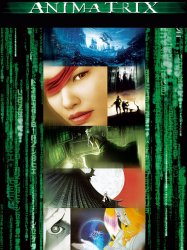The Matrix Revisited is a film of genre Documentary released in USA on 20 november 2001 with Lana et Lilly Wachowski
The Matrix Revisited (2001)
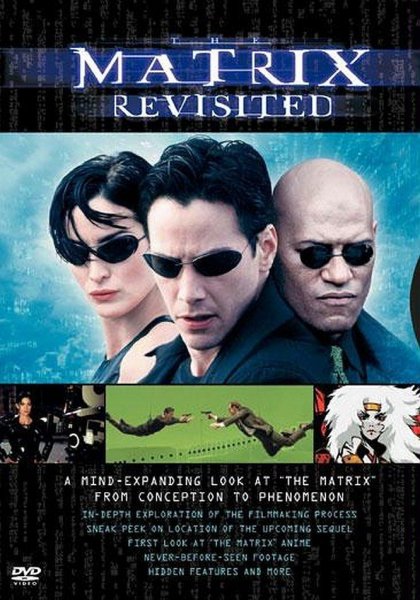
If you like this film, let us know!
- Infos
- Casting
- Technical infos
- Photos
- Videos
- Film quotes
- Characters
- Music
- Awards
Released in USA 20 november 2001
Length 2h3
Genres Documentary
Themes Films about films, Films about computing, Post-apocalyptic films, Films about religion, Sports films, Films set in the future, Martial arts films, Documentary films about business, Documentary films about the film industry, Political films, Dystopian films, Documentary films about films, Disaster films
Rating73%










The Matrix Revisited is a feature-length documentary on the production of the movie The Matrix.
The film goes behind the scenes of the 1999 sci-fi movie to give explanations of complicated scenes, previews of the then-forthcoming sequels, and interviews with the cast and crew, including the reclusive Wachowski siblings, who rarely give interviews.
It was first released as the first and only documentary in the series, but was later included as part of a two-disc Collector's Edition of The Matrix. It now forms part of The Ultimate Matrix Collection.
Synopsis
Un nouveau regard sur Matrix : de la conception au phénomêne.Actors

Lana et Lilly Wachowski
(Self - Director)

Hugo Weaving
(Self - Agent Smith)

Joel Silver
(Self - Producer)

Laurence Fishburne
(Self - Morpheus)

Keanu Reeves
(Self - Neo)
Comments
Leave comment :
Suggestions of similar film to The Matrix Revisited
There are 247 films with the same actors, 8861 with the same cinematographic genres, 16965 films with the same themes (including 0 films with the same 13 themes than The Matrix Revisited), to have finally 70 suggestions of similar films.If you liked The Matrix Revisited, you will probably like those similar films :

The Matrix (1999)
, 2h16Directed by Lana et Lilly Wachowski
Origin USA
Genres Science fiction, Thriller, Action, Adventure
Themes Films about computing, Philosophie, Post-apocalyptic films, Films about religion, Sports films, Transport films, Aviation films, Films set in the future, Martial arts films, Political films, Road movies, Kung fu films, Cyberpunk films, Dystopian films, Chase films, Robot films, Disaster films
Actors Keanu Reeves, Laurence Fishburne, Carrie-Anne Moss, Hugo Weaving, Joe Pantoliano, Gloria Foster
Rating82%





An infamous hacker called Trinity (Carrie-Anne Moss) is cornered in an abandoned hotel by police. She easily overpowers and escapes from them, but a group of sinister black-suited Agents with superhuman abilities lead the police in a rooftop pursuit after her. Upon picking up a ringing phone in a telephone booth, she vanishes without a trace.
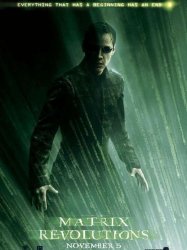
The Matrix Revolutions (2003)
, 2h9Directed by Lana et Lilly Wachowski
Origin USA
Genres Science fiction, Thriller, Martial arts, Action, Adventure
Themes Films about computing, Philosophie, Post-apocalyptic films, Films about religion, Sports films, Transport films, Aviation films, Films set in the future, Martial arts films, Films about disabilities, Political films, Kung fu films, Cyberpunk films, Dystopian films, Robot films, Disaster films
Actors Keanu Reeves, Laurence Fishburne, Carrie-Anne Moss, Hugo Weaving, Jada Pinkett Smith, Monica Bellucci
Rating67%





Neo and Bane lie unconscious in the medical bay of the ship Hammer. Meanwhile, Neo finds his digital self trapped in a virtual subway station—-named, "Mobil Ave.", "mobil", being an anagram for "limbo"-a transition zone between the Matrix and the Machine City. In that subway station, he meets a "family" of programs, including a girl named Sati, whose father tells Neo the subway is controlled by the Trainman, an exiled program loyal to the Merovingian. When Neo tries to board a train with the family, the Trainman refuses and overpowers him.
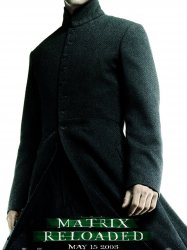
The Matrix Reloaded (2003)
, 2h18Directed by Lana et Lilly Wachowski
Origin USA
Genres Science fiction, Thriller, Martial arts, Action, Adventure, Martial arts
Themes Films about computing, Philosophie, Post-apocalyptic films, Films about religion, Sports films, Transport films, Aviation films, Motocyclette, Films set in the future, Martial arts films, Political films, Kung fu films, Cyberpunk films, Dystopian films, Robot films, Disaster films
Actors Keanu Reeves, Laurence Fishburne, Carrie-Anne Moss, Hugo Weaving, Harold Perrineau, Jr., Monica Bellucci
Rating71%





Six months after the events of the first film, Neo and Trinity are now lovers. Morpheus receives a message from Captain Niobe of the Logos calling an emergency meeting of all of Zion's ships. Zion has confirmed the last transmission of the Osiris: an army of Sentinels is tunneling towards Zion and will reach it within 72 hours. Commander Lock orders all ships to return to Zion to prepare for the onslaught, but Morpheus asks one ship to remain in order to contact the Oracle. The Caduceus receives a message from the Oracle, and the Nebuchadnezzar ventures out so Neo can contact her. One of the Caduceus crew, Bane, encounters Agent Smith, who takes over Bane's avatar. Smith then uses this avatar to leave the Matrix, gaining control of Bane's real body.
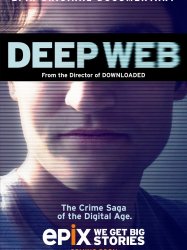
Deep Web (2015)
Directed by Alex Winter
Origin USA
Genres Documentary
Themes Films about computing, Documentary films about law, Documentary films about technology
Actors Keanu Reeves
Rating68%





Un film documentaire qui explore l’émergence d’une nouvelle version d’Internet, décentralisée, cryptée, dangereux et au-delà de la loi. en jetant un regard sur le côté trouble du cyberespace s'intéresse à l'arrestation et au procès du créateur présumé du marché noir en ligne Silk Road...

The Matrix Resurrections (2021)
Directed by Lana et Lilly Wachowski, James McTeigue
Origin USA
Genres Science fiction, Thriller, Action, Adventure, Romance
Themes Dystopian films
Actors Jonathan Groff, Keanu Reeves, Yahya Abdul-Mateen II, Carrie-Anne Moss, Jada Pinkett Smith, Lambert Wilson
Rating57%





Quatrième volet de la saga "Matrix", lancée en 1999.
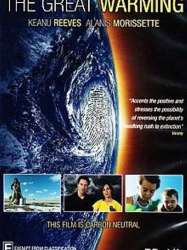
The Great Warming (2006)
, 1h25Origin USA
Genres Documentary
Themes Environmental films, Documentary films about environmental issues, Disaster films
Actors Keanu Reeves, Alanis Morissette
Rating64%





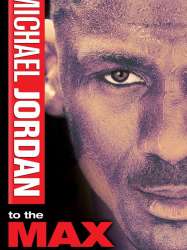
Michael Jordan to the Max (2000)
, 46minutesDirected by James D. Stern
Origin USA
Genres Documentary
Themes Sports films, Basketball films, Documentary films about sports
Actors Michael Jordan, Bill Murray, Laurence Fishburne, Spike Lee
Rating73%





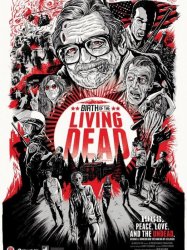
Birth of the Living Dead (2013)
, 1h16Origin USA
Genres Documentary
Themes Films about films, Medical-themed films, Post-apocalyptic films, Films set in the future, Documentary films about business, Documentary films about the film industry, Zombie films, Films about viral outbreaks, Documentary films about films, Disaster films
Actors George A. Romero, Gale Anne Hurd, Larry Fessenden
Rating69%





Rob Kuhns interviews a range of authors, critics, and filmmakers about the impact, legacy, and enduring popularity of Night of the Living Dead. Romero describes the film's background, production, and distribution, including how it accidentally fell into the public domain. Fessenden describes Night of the Living Dead 's aspects of postmodernist film, including an early commentary on horror films inside of a horror film – Johnny's taunting of his sister, Barbra, in the opening graveyard scene. Hurd cites the film as an influence on her own work as executive producer of The Walking Dead. Mitchell, among other things, describes how the film presents a strong Black male as the protagonist of a film without resorting to racial commentary. The final scene, in which Duane Jones' character, Ben, is killed by a posse is compared to historical footage of 1960s lynch mobs and police brutality, and scenes of violent zombie attacks are compared to footage from Vietnam broadcast on television.
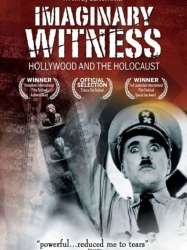 , 1h32
, 1h32Origin USA
Genres Documentary, Historical
Themes Films about films, Films about racism, Films about religion, Documentary films about business, Documentary films about the film industry, Documentary films about racism, Documentary films about law, Documentary films about war, Documentary films about historical events, Documentaire sur une personnalité, Documentary films about religion, Political films, Films about Jews and Judaism, Documentary films about World War II, Documentary films about films
Actors Gene Hackman, Robert Clary, Dan Curtis, Ralph Edwards, Ralph Fiennes, Ben Kingsley
Rating74%





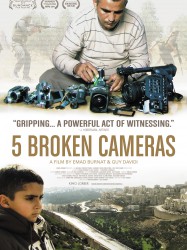
5 Broken Cameras (2011)
, 1h34Origin Israel
Genres Drama, War, Documentary, Crime
Themes Films set in Africa, Films about films, Films about religion, Documentary films about business, Documentary films about the film industry, Documentary films about law, Documentary films about war, Documentary films about historical events, Documentaire sur une personnalité, Documentary films about politics, Documentary films about religion, Political films, Films about Jews and Judaism, Documentary films about films
Rating78%





There are five cameras — each with its own story. When his fourth son, Gibreel, is born in 2005, self-taught cameraman Emad Burnat, a Palestinian villager, gets his first camera. At the same time in his village of Bil’in, the Israelis begin bulldozing village olive groves to build a barrier to separate Bil'in from the Jewish Settlement Modi'in Illit. The barrier's route cuts off 60% of Bil'in farmland and the villagers resist this seizure of more of their land by the settlers.
 Connection
Connection


